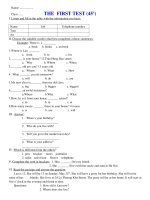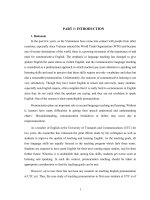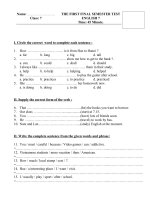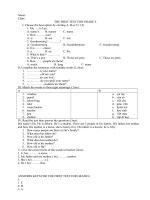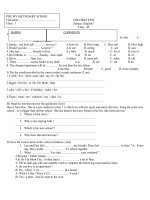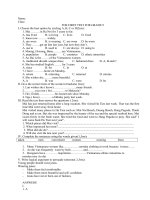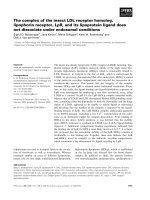2020
Bạn đang xem bản rút gọn của tài liệu. Xem và tải ngay bản đầy đủ của tài liệu tại đây (108.79 KB, 6 trang )
<span class='text_page_counter'>(1)</span><div class='page_container' data-page=1>
<b>Tuần 25. ÔN KIỂM TRA – UNIT 7</b>
<b>A. PHONETICS</b>
<b>I. Find the word which has the different sound in the underlined part.</b>
1. a. break
b. bread
c. instead
d. health
2. a. lane
b. stay
c. traffic
d. wait
3. a. record
b. vehicle
c. lesson
d. zebra
4. a. jam
b. narrow
c. carry
d. danger
5. a. breaking
b. great
c. steak
d. healthy
6. a. reversed
b. walked
c. stopped
d. obeyed
7. a. park
b. pavement
c. plane
d. safety
<b>B. VOCABULARY AND GRAMMAR</b>
<b>I.Match the words in part 1 with definitions.</b>
1. A large, heavy vehicle with wheels. It is used for carrying goods.
__________
2. A vehicle with two wheels that you ride by pushing its pedals with your feet __________
3. A vehicle that has two wheels and an engine.
__________
4. A large machine that runs along a railway line. It can carry many people.
__________
5. A very large boat used for carrying people or goods across the sea.
__________
6. A aircraft with large metal blades on top that spin and lift it into the air.
__________
7. A vehicle that flies in the sky and has wings and one or more engine.
__________
8. A large vehicle with lots of seats. It carries passengers from one place to
another.
__________
9. A small vehicle that travels on water, moved by oars, sails or a motor.
__________
10. A railway system that runs under the ground below a big city.
__________
<b>II. Complete the sentences with the correct tense or form of the verbs from the box.</b>
1. My uncle used to be a pilot. He ___________ helicopters.
2. __________ a number 73 bus. That will take you to Islington High Street.
3. He ________into a lamppost and damaged the back of the car.
4. When being stuck in a traffic jam, some people __________ their motorbikes on the pavement.
5. The old man got into a Rolls Royce and __________ away.
6. I will get myself a little boat and ________ it around the world.
7. When we reach the next stop, we’ll ____________.
8. In the afternoon, Mai usually _____________ round the lake near her house.
<b>III. </b>
<b>A. Fill in the each gap with an expression in the box.</b>
<b>plane tickets zebra crossings driving license traffic jam speed limit </b>
<b>cycle helmet means of transport road safety railway station road sign</b>
1. Be careful! The _____________ says “No U-Turn”.
2. You ran through the stop sign. May I see your ________________, please?
3. It is the law that motorists give way to pedestrians at _______________.
4. You can book your _______________ online, by phone, or through a travel agent.
5. Slow down – the _______________ on this road is 60 mph.
6. We were stuck in a _______________ on the freeway for two hours.
7. When we got to the _______________ the train had left.
8. What _______________ did they use at that time? – horses
9. _______________is taught to young children to avoid road accidents.
10. You should wear a _______________ when riding a bike.
<b>B. Supply the correct form of the words in brackets</b>
1. Young children are expected to show _____________ to their parents. (obey)
2. When cycling on the roads, remember: _____________ first. (safe)
3. Children should avoid _____________ foods such as hamburger and chips. (health)
4. Most road accidents happen because the motorists drive _____________. (care)
5. It is unsafe and _____________ to pass another vehicle on the left. (legal)
6. My _____________ was delayed for over two hours due to bad weather. (fly)
7. Everyone should _____________ obey traffic rules for their own safety. (strict)
</div>
<span class='text_page_counter'>(2)</span><div class='page_container' data-page=2>
8. The policeman _____________ the car to stop with a flashlight. (sign)
9. Signs with red circles are mostly _____________ - that means you can’t do something. (prohibit)
10. This _____________ sign indicates that traffic lights are ahead. (warn)
<b>IV. CHOOSE THE BEST A, B, C OR D</b>
1. You should walk across the street ______ the zebra crossing.
a. on
b. at
c. in
d. from
2
.
My house is not far from my school, so I usually go ______.
a. on foot
b. by foot
c. by car
d. by boat
3. This morning, I was ______ in a traffic jam and got to school fifteen minutes late.
a. catch
b. block
c. struck
d. stuck
4. Turn on the left turn ______ before you make the turn and slow down.
a. sign
b. direction
c. signal
d. crossing
5. It is ______ to use a hand-held mobile phone while driving or riding.
a. safe
b. important
c. illegal
d. careful
6. ______ does it take you to ride to school? – About 30 minutes.
a. How long
b. How far
c. How often
d. How much
7. A ______ is a part of a road that only bicycles are allowed to use.
a. cycle cross
b. cycle lane
c. cycle line
d. cycle race
8. You ______ cross the street when the light is red.
a. should
b. don’t have to
c. can
d. mustn’t
9. People ______ produce as much rubbish as we do now.
a. use to
b. used to
c. used to not d. didn’t use to
10. “How far is Vung Tau from Ho Chi Minh City”-“_______”
A. It’s not very far
b. it takes about two hours or more.
c. It’s about 120km
d. You can get to Vung Tau by boat or bus.
<b>GRAMMAR:</b>
<b>Complete the sentences with used to or didn’t use to and the verbs in the box.</b>
<b>play wash be eat like travel live work</b>
1. I _____________ in the countryside when I was a child.
2. My mother _____________ coffee but now she loves it.
3. Julian _____________ much, but Harry Potter changed his attitude.
4. Dave _____________ in a football team but now he plays basketball.
5. The children _____________early because they had to get to school at 7 o’clock.
6. The shop _____________ so crowded as it is nowadays.
7. In those days, people _____________ all their clothes by hand.
8. I _____________ in a restaurant before I went to college.
9. People _____________ so much junk food, their diet was healthier.
10. When my father was young, he _____________ abroad so much.
<b>IV. Write sentences, using the prompts and then correct form of used to.</b>
Công thức used to (đã từng)
- câu khẳng định: S + used to + V …..
- câu phủ định: S + didn’t use to + V ….. (khi mượn trợ động từ didn’t bỏ “ d” sau use )
- câu hỏi: Did + S + use to + V?
Từ hỏi + did + S + use to + V?
1. We/ live in a flat when I was a child.
_________________________________________________________________
2. People/ not have/ mobile phones 20 years ago.
_________________________________________________________________
3. Jim/ go/ swimming every weekend?
_________________________________________________________________
4. My father/ smoke/ but he gave up five years ago.
_________________________________________________________________
5. Lily/ not cook/ much, but now she makes dinner every day.
</div>
<span class='text_page_counter'>(3)</span><div class='page_container' data-page=3>
6. There/ be/ a supermarket on the corner?
_________________________________________________________________
7. People/ not buy/ so much stuff as they do today.
_________________________________________________________________
8. You/ play football or basketball at school?
_________________________________________________________________
9. I/ go/ to bed very late but not anymore!
_________________________________________________________________
10. Which TV programme/ you/ watch/ most/ when you were little?
_________________________________________________________________
5. My Grandpa never__________ coffee. He always drank tea.
a. uses to like
b. used to like
c. didn't use to like
d. is used to like
6. She________ as a teacher for many years before she became a writer
a. didn't use to work
b. used to worked
c. used to work
d. worked
7. There______ a bus station there. When was it built?
a. used to be
b. usedn't to be
c. didn't use to be
d. used not being
8. Dominic _________ to bed late on Fridays and Saturdays.
a. usually goes
b. uses to go
c. doesn't use to go
d. is used to go
9. What kind of music ________when she was a child?
a. Nancy used to like
b. used Nancy to like
c. did Nancy used to like
d. did Nancy use to like
10. He _______several books a month, but he doesn't have time any more.
a. usually reads
b. used to read
c. used to reading
d. didn't use to read
<b>XI. Write sentences with it, using the cues given.</b>
Example: 700 metres/ my house/ gym
It is about 700 metres from my house to the gym.
1. 150 million kilometres/ Earth/ sun
_____________________________________________________________
2. 105 km/ Hanoi/ Hai Phong.
_____________________________________________________________
3. 500 metres/ my house/ my school
_____________________________________________________________
4. 170 km/ Quy Nhon City/ Pleiku City
_____________________________________________________________
5. not very far/ here/ Tan Son Nhat Airport
_____________________________________________________________
6. a long way to go/ Hue/ Ho Chi Minh city
_____________________________________________________________
<b>XII. Write sentences, using the cues given.</b>
Example: your house/ school/ 2 kilometres/ go/ bike.
A: How far is it from hour house to school?
B: It’s about 2 kilometres.
A: How do you go to school?
B: I go to school by bike.
1. your village/ the town/10 kilometres/ travel/ motorbike
A: _____________________________________________________
B: _____________________________________________________
A: _____________________________________________________
B: _____________________________________________________
2. Nga’s house/ her grandparents’ house/ 700 metres/ go/ foot
</div>
<span class='text_page_counter'>(4)</span><div class='page_container' data-page=4>
A: _____________________________________________________
B: _____________________________________________________
4. Jim’s office/ the restaurant/ not very far/ go/ walk
A: _____________________________________________________
B: _____________________________________________________
A: _____________________________________________________
B: _____________________________________________________
<b>VIII. Fill in each blank with an appropriate preposition</b>
1. Mai used to go to school __________ food when she was ________ primary school.
2. My father usually travels to Hanoi ____________plane.
3. Mai often cycles round the lake _________Saturday morning.
4. What are you doing ________ the weekend?
5. We were stuck __________a traffic jam for over two hours.
6. How far is your school________ your house?
7. I got ___________at the wrong stop and had to wait ________another bus.
8. Yesterday I saw a horrible accident__________ my way home from school.
9. Many years ago, people didn't use to be worried__________traffic jams.
10. It's illegal _________women to drive __________ Saudi Arabia .
<b>COMMUNICATION</b>
<b>1/ Complete the dialogue from A-H </b>
<b>A.</b>
What time do you usually go to school?
<b>B.</b>
How often do you get stuck in a traffic jam?
<b>C.</b>
How do you go to school?
<b>D.</b>
Is your house far from school?
<b>E.</b>
Why did you come to class late this morning?
<b>F.</b>
How far is it from your house to school?
<b>G.</b>
How long does it take you to go to school?
<b>H.</b>
When do you often get stuck in a traffic jam?
Ann:
Huan:
Ann:
Huan:
Ann:
Huan:
Ann:
Huan:
Ann:
Huan:
Ann:
Huan:
Ann:
Huan:
Ann:
Huan:
Ann:
Huan:
Hi Huan! (1)___________________________________________
I came to class late this morning because I was stuck in a traffic jam.
Really? (2)________________________________________
Yes, my house is rather far from school
(3)_______________________________________________
Um...about 5 kilometres
(4)_______________________________________________
I go to school by bike.
(5)_______________________________________________
It takes me about 30 minutes. And it takes longer when the traffic is jammed.
(6)______________________________________________
I get stuck in a traffic jam once or twice a week.
(7)______________________________________________
I often get stuck in a traffic jam on Monday morning.
(8)________________________________________________
I usually go to school at 6.15.
So why don't you start to school a little earlier on Monday?
Okay, I'll try
<b>READING</b>
<b>1. THE FIRST ELECTRIC TRAFFIC LIGHTS</b>
In the early 1900's, the world was developing at a very rapid pace, and with the growth of
industrialization, cities became more crowded. Furthermore, with the invention automobiles, the traffic on the
roads increased significantly, so there was a need for a better traffic system.
</div>
<span class='text_page_counter'>(5)</span><div class='page_container' data-page=5>
The first electric traffic light had only red and green lights; it did not have a yellow light like modern-
day traffic signals. Instead of a yellow light, it had a buzzer sound that was used to indicate that the signal would
be changing soon.
In the year 1920, a policeman named William Potts in Detroit, Michigan invented the first four-way and
three-coloured traffic lights. Apart from red and green, a third colour - amber (or yellow) - was introduced. Detroit
became the first city to implement the four-way and three-colored traffic lights. In the 1920's, several automated
traffic signals were installed in major cities around the world. The modern traffic light still uses this famous
T-shaped model with three different colors.
<b>A/ Decide whether the following sentences are true (T) or false (F). </b>
1. Due to the invention of cars, the traffic on the roads increased rapidly.
2. The first electric traffic light was invented in 1914 by Lester Wire.
3. The first electric traffic light had red, green and amber lights.
4. The yellow light didn’t exist until the 1920s.
5. Detroit was the first city to use the red, yellow, and green lights to control road traffic.
6. The modern traffic light works on the same principle as Wire’s original light.
<b>b/ Answer the questions with NO MORE 4 WORDS</b>
1. When was the first electric traffic light invented?
- The first electric traffic light invented ………
2. Who invented the first electric traffic light?
- ……… invented the first electric traffic light.
3. How many colours did the first electric traffic light have?
- The first electric traffic light had ………
4. Where were the lights first installed?
- The lights were first installed in Cleveland, Ohio, on August 5, 1914, at ……….. and Euclid
Avenue.
5. What was used instead of yellow light to warn everyone of a signal change?
- ……… was used instead of yellow light.
6. When was the yellow light added?
- The yellow light was added ……….
<b>2. Choose the word which best fits each gap.</b>
<b>Staying safe on foot and bike</b>
Look out for yourself and your friends when out (1)________ foot and bike. Choose the (2) ________
routes you can like quieter, slower roads, with pavements if you’re walking or (3) ________ if you’re going by
bike.
It’s easy to get distracted by your phone or by friends, but you need to be (4)________ to traffic. Put your
phone away and take your earphones (5)________ when crossing the road. Don’t trust that drivers (6)_______
spot you and be able to stop in time – many drivers go too fast and don’t (7) ________ enough attention,
(8)________ anything you can do to protect yourself is a good thing.
1. a. on
b. in
c. by
d. with
2. a. safe
b. safer
c. safest
d. safely
3. a. zebra crossings
b. cycle paths
c. footpaths
d. bumpy roads
4. a. risky
b. warning
c. serious
d. alert
5. a. off
b. over
c. out
d. down
6. a. must
b. will
c. could
d. should
7. a. pay
b. make
c. turn
d. take
8. a. but
b. so
c. though
d. because
<b>3. Read the text carefully, then do the tasks.</b>
Large cities often have problems that small towns and rural areas do not have. Two of the biggest problems
are heavy traffic and the pollution that cars create. Of course. Traffic problems and pollution are not only found in
big cities. However, the higher populations and larger number of cars on the roads in cities can make the problems
happen more often and with more noticeable effects.
One of the most common traffic problems the large cities have is congestion. As the population of a city
increases, so does the number of cars on the road. Cities cannot always improve the number and size of their roads
and highways to keep up with the number of cars. The result is traffic congestion, or traffic jams.
</div>
<span class='text_page_counter'>(6)</span><div class='page_container' data-page=6>
<b>A. Match the words with their meanings.</b>
1. rural
a. being too crowded or too full
2. noticeable
b. unable to move
3. congestion c. easy to see or recognize
4. traffic jam
d. in the countryside, not in the city
5. stuck
e. too many vehicles in one place prevents
<b>B. Choose the correct answers. </b>
1. Where do traffic problems and pollution frequently happen?
a. small towns
b. rural areas
c. big cities
d. remote villages
2. According to the passage, what causes traffic congestion in big cities?
a. A lot of city dwellers
b. Too many cars on the roads
c. Careless drivers
d. Less traffic signs on the streets
3. The high number of cars is caused by_________
a. urban planning
b. traffic congestion
c. environmental pollution
d. the population
4. The highway and road network is ________ of meeting the requirement of increasing number of vehicles.
a. full
b. aware
c. incapable
d. uncertain
5. Which of the followings is NOT true? 5.
a. Only big cities have the problem of pollution.
b. Traffic jams cause pollution
c. Pollution is a major problem in big cities.
d. Pollution causes health and environmental problems.
<b>V. WRITING</b>
<b>I. Complete the second sentences so that it has the same meaning as the first. </b>
1. I went swimming every Thursday when I was at school.
- I used ………..
2. The distance between my house and the nearest bookstore is about 2 kilometres
- It ………..
3. What’s the distance from Madrid to Barcelona?
- How ………..?
4. Did your father use to drive to work?
- Did your father use to travel ………?
<b>II. Arrange the words to make meaningful sentences. </b>
1. big/ traffic congestion/ can/ what/ do/ to/ we/ reduce/ cities/ in?
____________________________________________________________________
2. is/ the/ your/ train station/ how/ hotel/ to/ far/ it/ from ?
____________________________________________________________________
3. my/ it/ not/ is/ far/ very/ house/ from/ to/ school.
____________________________________________________________________
<b>III. Make a question for the underlined words</b>
<b>1.</b>
He can ride a bicycle to go to work..
………..
<b>2.</b>
It about 1137 kilometres from Hanoi to Ho Chi Minh City.
………
<b>3.</b>
Mai went to school on foot when she was in primary school.
</div>
<!--links-->


